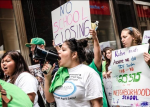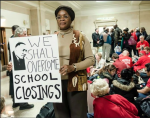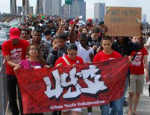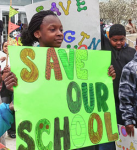Students, teachers, and community members in urban communities are engaging in grassroots activist work and fighting against school closures by giving voice to community members in public forums, offering information and resources about the politics and economics of school closure, and encouraging others to pursue quality, community-based public education for all students. While school closure issues may fluctuate in relevance and importance depending on the state of funding, enrollment, city leadership, and other factors, school closure remains a significant concern for high needs communities in these cities.
The eight grassroots organizations listed below are (or were in recent years) at the forefront of education activism against school closure in their communities. The brief descriptions originate from information shared on each group’s main website.
Chicago, IL
1. Chicago Students Organizing to Save Our Schools
(@ChiStudentsOrg and on Facebook)
CSOSOS supports access to quality public education by working against school closures, budget cuts, privatization, high-stakes testing, violence, and racism. In the summer of 2014, CSOSOS protested CPS’s budget cuts targeting neighborhood schools at the BOE meeting. In the spring of 2013, CSOSOS learned that the mayor and BOE were planning to close 54 local schools, mainly in Black and Latino neighborhoods. The students participated in the city-wide Chicago Students’ Boycott to Stop School Closings.P9
 2. Teachers for Social Justice (Chicago) (@TeachForJustice and on Facebook)
2. Teachers for Social Justice (Chicago) (@TeachForJustice and on Facebook)
TSJ consists of educators fighting for anti-racist, multicultural/lingual, critical, challenging classrooms and schools grounded in student and community experience. They support each other with curriculum and school-based projects and engage in activist work to promote teacher voices. Their website offers resources about school closure, including fact sheets about school closings generally and in Chicago, updates from BOE meetings, and school closure curriculum materials for ninth- and tenth-grade civics classes. TSJ members participate in numerous social justice-oriented rallies, strikes, and marches across Chicago.P10
New York City, NY
 3. Urban Youth Collaborative (NYC) (@UYC_YouthPower and on Facebook)
3. Urban Youth Collaborative (NYC) (@UYC_YouthPower and on Facebook)
After the 2004 school restructuring in the Bronx and Brooklyn neglected to take student perspectives and voices into account, students began to organize to form the UYC, focusing on achieving social, economic, and racial justice in local schools and communities. Their current efforts include working to end the school-to-prison pipeline, improving educational outcomes for all students, and supporting struggling schools in danger of closing. UYC leads Youth Organizing Institutes to inform and train students in activist work. Their website includes news about NYC school closures’ impact on students in high-needs communities.P11
 4. New York Collective of Radical Educators (@NYCoRE3000 and on Facebook)
4. New York Collective of Radical Educators (@NYCoRE3000 and on Facebook)
NYCoRE is a group of public school educators and allies who are committed to social justice inside and outside of schools. They believe that schools should be intricately connected to their communities and should be equitably funded. When the DOE targeted 47 schools for closure in the five boroughs, NYCoRE organized “Occupy the DOE” in the spirit of the Occupy Wall Street Movement, to reclaim quality public education and public institutions for their respective communities.P12
Philadelphia, PA
 5. Philadelphia Student Union (@215studentunion and on Facebook)
5. Philadelphia Student Union (@215studentunion and on Facebook)
About 150 Philly students from school-based chapters regularly attend PSU meetings and events and work to achieve high quality education in city schools and collaboration in community across difference. PSU members demonstrate and march in their local, state, and national communities. Recently, PSU collaborated with filmmakers to produce a series of videos, including one entitled “The Cycle of School Closure” that describes how school closure comes about and how students can fight against it. In their spring 2013 statement on school closings, PSU explains the tangled roots of school closure and the role of student engagement and activism.P13
 6. Philadelphia Coalition Advocating for Public Schools (@PCAPS_Philly and on Facebook)
6. Philadelphia Coalition Advocating for Public Schools (@PCAPS_Philly and on Facebook)
PCAPS is an organization of students, teachers, and parents fighting for equitable funding of quality public schools for all, ending the deliberate disinvestment and underinvestment of Philly public schools. Their website lists numerous organizations who support the one-year moratorium on school closure until the district fully evaluates the effects of school closure on communities. In December 2014, for the second year in a row, the Philadelphia School District announced that it will not propose any school closures. PCAPS details the cost of school closure, which includes hurting neighborhoods, uprooting children and placing them at risk, preventing the improvement of educational outcomes, often saving little money and instead costing money, and increasing poverty.P14
 7. West Philly Coalition for Neighborhood Schools (@WPCNS and on Facebook)
7. West Philly Coalition for Neighborhood Schools (@WPCNS and on Facebook)
The WPCNS aims to bring the rich resources of local communities into neighborhood public schools. This diverse group of parents and community members is focusing on Henry C. Lea Elementary School, a school with mainly African-American, low-income students. WPCNS is working to improve Lea’s outdoor space and music programming. By improving the elementary school, they hope it will bring the community together around the school, improving educational outcomes and social bonds and relationships. When a proposal to close eight neighborhood schools (including five elementary schools) in West Philly was announced in December 2012, WPCNS wrote a response affirming their commitment to local schools that children can walk to and from each day and asserting that the Philadelphia School District’s decision would harm these communities.P15
Washington, D.C.
 8. Empower D.C. (@EmpowerDC and on Facebook)
8. Empower D.C. (@EmpowerDC and on Facebook)
Members of Empower D.C. aim to bring together their voices to build political power around issues including housing, child care, public property, and public education. Their current public education campaign seeks to inform the public about school closure issues in the city and to demand investment in existing schools. This video demonstrates the activism of River Terrace students who are testifying against the closure of their school in an Empower D.C. forum. In March 2014, Empower D.C. rallied in support of a lawsuit they were filing to stop the closure of fifteen D.C. schools, which the city claimed to be under enrolled and fiscally inefficient.P16
